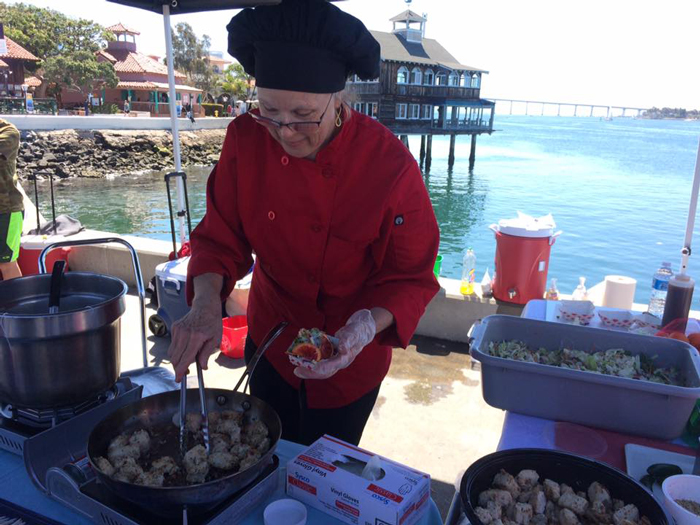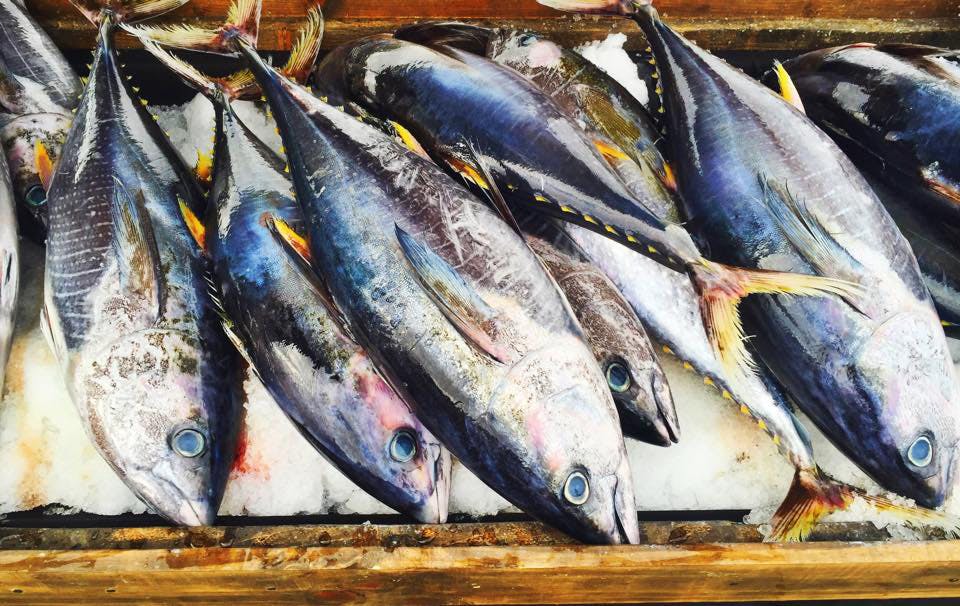San Diego-Area Chef Works to Turn the Tide for Local Seafood
Third in a series examining efforts to make California health care more environmentally friendly.
Locally caught bigeye tuna on ice at San Diego’s Tuna Harbor Dockside Market.
Cindy Quinonez grew up in a family that loved fishing, everywhere from the Sierra Nevada to Baja California. She occasionally tagged along, but didn’t fish: “I was more into books,” she remembers.
As an adult who wears many hats — mother, grandmother, food services manager at Paradise Valley Hospital near San Diego — Quinonez has been drawn back into the world of fish by an awareness that today’s children are increasingly disconnected from their food. “Kids don’t connect with food or know where it comes from,” she says. “Look at the number of kids who are diabetic, pre-diabetic, or obese. Prevention is so much better than dealing with the ravages of disease.” Prevention, she thinks, should start with local, sustainable food. With her fishing roots, she’s particularly partial to seafood.
While the movement to eat more local meat and produce gathers steam throughout North America, more than 80% of seafood consumed in the U.S. is still imported. A study found that even in coastal San Diego — once known as the “tuna capital of the world” — only 8% of 86 seafood markets carried one or more local seafood products throughout an average year. Moreover, Theresa Sinicrope Talley, the study’s lead author, said over email that these markets tended to be small. She found several possible explanations for the limited supply, including low public awareness of local fisheries, the mismatch between seafood species San Diegans prefer and the species caught in San Diego, and limited waterfront infrastructure needed to process and distribute local seafood.
San Diego hospitals, nonprofits, schools and other organizations have banded together to increase awareness of, and demand for, local seafood. In their work to support policies that ensure sufficient infrastructure for local seafood, one name comes up repeatedly: “Cindy’s at the eye of the storm,” says Elly Brown, director of the San Diego Food System Alliance.
In April 2017, the Alliance convened a panel of stakeholders involved in discussions about Seaport, a $1.2 billion waterfront development project. Local fishers are concerned that the project could reduce the infrastructure they need to provide seafood locally.
Quinonez, co-chair of the Alliance’s sustainable seafood working group, managed event logistics and organized a demo of two tuna pâtés, made from locally sourced and non-local canned tunas, respectively. “People could taste the difference. It’s night and day,” she says.
In addition to advancing dialogue, the event expanded the community invested in the conversation about Seaport. “If it’s only fishermen involved, the developer will get its way. If people in the community support the fishermen, the fishermen can win,” says Quinonez’ working-group co-chair Pete Halmay, who has fished the waters off San Diego for 44 years.

Cindy Quinonez demonstrating her almond-crusted opah recipe at a Seafood Saturday event in 2016.
Beyond representing the health-care perspective at meetings about Seaport, Quinonez’ efforts on behalf of San Diego fishers include regularly creating recipes using local seafood. She provides free samples of her creations at monthly Seafood Saturdays events, held by Slow Food Urban San Diego at the open-air Tuna Harbor Dockside Market. Those who’ve tried her recipes — including almond-flax-seared ono and sweet-and-sour rockfish — say they’re healthy and delicious.
“You don’t have to buy salmon from Alaska. At the last Seafood Saturday, Cindy made mackerel,” says Halmay. “She’s the catalyzer. You have to lead people into trying different things.”
Like many people who care deeply about the environment, but don’t have ‘sustainability’ in their job titles, Quinonez says that while some of her work is “on the clock,” much of it is done in her personal time (see also, Dr. Seema Gandhi in the first story in this series). Quinonez volunteers for events like Seafood Saturdays in part because of evidence that events like this can drive sustainable food purchases.
For instance, at last September’s Good Food Showcase, a few dozen local farmers and fishers showcased their products to 200 food services professionals. Collectively, attendees spent $120,000 on sustainable food after the event, according to Prem Durairaj, director of food systems and research at event host Community Health Improvement Partners, a San Diego public health organization.
But Quinonez says she’s also motivated by relationships. “Getting to know them, understanding their struggles and talking about how we can help each other has been one of the best parts of this work,” she says of the fishers. “We’re best friends now.”
I didn’t have a huge commitment to sustainability until I got to San Diego. Cindy was the main driver.
She also raves about other hospital food-service leaders who support local seafood, and they reciprocate. Chris McCracken, director of nutrition services at University of California San Diego Health, credits Cindy with igniting his interest in sustainable seafood. “I didn’t have a huge commitment to sustainability until I got to San Diego. Cindy was the main driver. She was passionate about this,” he says.
McCracken and Quinonez say that serving local seafood to patients at hospitals is hard to do at scale, given strict regulations, but changing cafeteria food for employees and patients’ families is lower hanging fruit. “We made fish tacos at our cafeterias, but we used local rockfish instead of tilapia. It was great-tasting and people didn’t even realize it was a different fish,” says McCracken.
Whether through serving local seafood in the cafeteria, or advocating for sustainable food policies, Quinonez believes health-care organizations have a unique opportunity to improve the health of both the environment and their communities. “We’re part of organizations that are here to improve health in our communities,” says Quinonez. “You can’t get to health and wellness for the community with a broken food system.”
Previously in the series “A Greener Bill of Health”: “UCSF’s Dr Seema Gandhi Tackles Sleeper Pollutants in the Operating Room” and “Dignity Health’s Environmental Evangelist”
